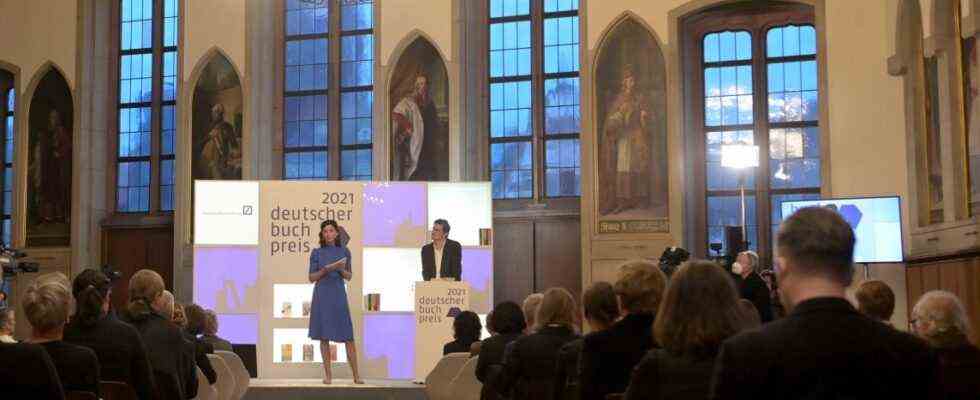Every art has its own scene. The cinema has its cineastes, the theater its audience, the museum its visitors. And what does literature have? Of course, the book has its readers. And then there is the literature business. Even with this word, which sounds like goods traffic and production relationships, there are difficulties: How big the circle of initiates is in this company called literature seems ambiguous. Lecturers and publishing staff, yes, they are one of them. It becomes more difficult with the book bloggers who have appeared in droves in recent years, not to mention the countless interns and volunteers who, after all, keep the “store” running – another corporate metaphor. And because it is so unclear who belongs to this production community, the Frankfurt Book Fair, the most important book meeting in the world, is a kind of exhibition for the industry, a family celebration, a bibliophile self-insurance.
The presentation of the German Book Prize is traditionally the start of the book fair week. Because of the pandemic and with great complaints, the annual social event last year in the lordly Imperial Hall of the Frankfurter Römer was condensed to a few critics watching at lame high tables. This year the company wanted to regain its splendor with at least 160 admitted guests.
There was also the stern looks of the 52 emperors who adorn the hall, from Charlemagne to Franz II. The six shortlisted authors took their places below them. In their backs the publishing entourage, above all the Hanser Verlag, which with three nominated books had an unequal chance of winning the prize, but went away empty-handed.
The colorful buzzword identity politics is on everyone’s lips. It’s involuntarily weird
There had been bets in advance as to whether Christian Kracht, who was also nominated for the award, would even arrive. After all, he had just turned down his nomination for the Swiss Book Prize and is otherwise generally regarded as indifferent to literary prize events. Editor-at-Large, his former Kiepenheuer & Witsch publisher and still editor Helge Malchow, who warned even before the award was made that one should never be guided by political criteria when assessing literary quality, did not leave his side.
With a look at the list of nominees, this warning seems to lose its urgency. The variety of literary pitches was praised in high tones. Even the winning novel “Blue Woman” by Antje Rávik Strubel is anything but an identity-political manifesto. But Malchow seemed to have set the tone for the evening with his concern. The colorful buzzword identity politics is on everyone’s lips. And precisely because those present constantly assure themselves that it shouldn’t be important in the literary industry, they make it the salon theme par excellence. Especially since on this evening, at the start of the trade fair, the dominant discussion of the coming book days is often set.
At the opening, the moderator Cécile Schortmann asks urgently not to let the categories speak for themselves on this evening, but rather the works. Ina Hartwig, head of the Frankfurt cultural affairs department, does not want books to only deal with certain topics, meaning that they are political issues of the present. Polyphonically, the artistic autonomy of the book is celebrated on this evening. Against whom this anti-identity political incantation is directed remains vague. Antje Rávik Strubel, who insists in her acceptance speech on wanting to be called “writer” and not “writer” and who is also enthusiastic about the gender star, will probably not be meant. After all, to thunderous applause, she has just received the most important German book award.
Perhaps that is what holds the company together: a topic that carries over from the stages to the bar tables, that occupies the publishers as much as the interns. So you can hear it from some corners “Identity” sound this evening. Even later, when the group around Antje Rávik Strubel, who was still visibly moved, moved to the Roman Halls, the conversation did not break off. And the later the evening, the more indistinct it becomes to the times one yearns to look back, when it would have been possible to keep politics away from literature.
That political content and aesthetic quality can go hand in hand has been shown by the literature that has won the book prize in the last two years, Saša Stanišić with “Origin” and Anne Weber with “Annette, a heroine epic”. This is also shown by Strubel’s “Blue Woman”. If a tendency can be deduced from this, then at most: Political questions, just like all others, can be the subject of a good book. But whether a book is good or not depends on other characteristics.

